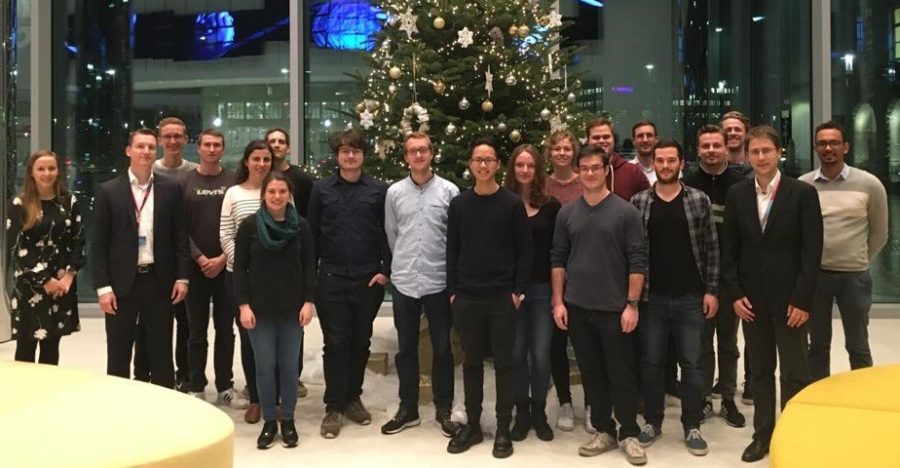Merck Visit in Darmstadt
Merck Visit in Darmstadt
On December 11, 2019, the Merck Site Visit took place in Darmstadt. Led by Michaela Gratzfeld, Leon Tuyishime and Michael Hell (Merck KGaA), we got an exciting insight into tablet production and research at Merck’s main plant.At the beginning, Leon Tuyishime and Michaela Gratzfeld introduced the Karlsruhe ISPE Student Chapter to the participants. The Merck company was then presented to us by Michael Hell. Merck is a global pharmaceutical and chemical company with around 56,000 employees in 66 countries (as of 2019). Limited liability shareholders hold around 30% of the total capital of Merck KGaA (partnership limited by shares), while the Merck family holds around 70% via E. Merck KG as general partner. The Merck corporate concept is divided into three main areas: Healthcare, Life Science and Performance Materials. In the Healthcare sector, Merck employees develop drugs for general medicine, endocrinology, oncology, neurology and immunology, help with unfulfilled children’s wishes or immunotherapy for allergies. The Life Science division includes clinical and diagnostic services, biotechnology, environmental and food analysis, industrial microbiology, biopharmaceutical production, drug discovery and drug quality control. In the last main area of Performance Materials, the company has specialized in automotive, displays, effect pigments, functional solutions, cosmetics and optoelectronics, and is now also investing more and more in semiconductor research.
Following the round of introductions, Gertjan Reichman (Merck KGaA) gave an interesting presentation on “commercial drug production at Merck”. This involved strategies for estimating whether it is profitable from a mathematical and statistical point of view to convert from the traditional batch process to continuously producing equipment. Gertjan Reichman presented approaches to the participants in order to adequately compare the different aspects of retrofitting. The locations Germany, China and Brazil were chosen to show differences of the different countries and to present possible difficulties. The result of the case study was that the conversion from a batch process structure to a continuous one was not worthwhile from an economic point of view.
Afterwards, the development laboratory for solid dosage forms and the tablet production line were visited in two groups. In the development laboratory, research is currently being conducted on a continuous system for granulation, drying, compression and coating of tablets to determine the functionality and effectiveness, but also the limits of the system. Furthermore, 3D printing technology is also making its way into tablet production. In the course of this, the participants were able to experience the research first-hand, as the three members of the research team not only showed the groups the equipment and its workplace structure, but they were also allowed to observe the devices live in action. Difficulties and current other research issues, as well as progress and creative provisional aids to achieving the research goal, were explored in more detail, providing a broad insight into the innovation area of the development lab.
The tablet production tour included a presentation of the large granulating, drying, compression and coating facilities, which are designed to produce more than 10 billion tablets per year (equivalent to about 50-60% of Merck KGaA’s total global tablet production). For the optimization and ergonomization of production, the equipment was specially designed for tablet production, this was also allowed to experience live. In addition to manufacturing, there was also the analytical section to see. The deputy department manager of tablet production also showed the participants the difficulties and safety concepts (especially regarding cleanliness) and explained how the building infrastructure had to adapt to increase production from 3 to over 10 billion tablets.
Between the two tours, it was possible to discuss the impressions gained at length over lunch with the research team from the development laboratory, specialists from the human resources area and the production line. The final presentation showed the participants the career paths of employees, entry-level opportunities, concepts for professional development and social activities of the Merck Group. The Merck employees present repeatedly emphasized the company’s pleasant family policy and the development and training of employees (instead of filling new positions). After the presentation was over, the employees present were peppered with all kinds of questions from the participants during an extensive round of talks. This covered interest in both the engineering and human resources fields. After arriving in Karlsruhe we had dinner together, whoever felt like it.
A big thank you goes to the Merck Site Visit organizing team, Michaela Gratzfeld and Leon Tuyishime for leading the organization and Michael Hell from Merck Group for taking care of the exciting tours and lectures.
Your Maximilian Ell
